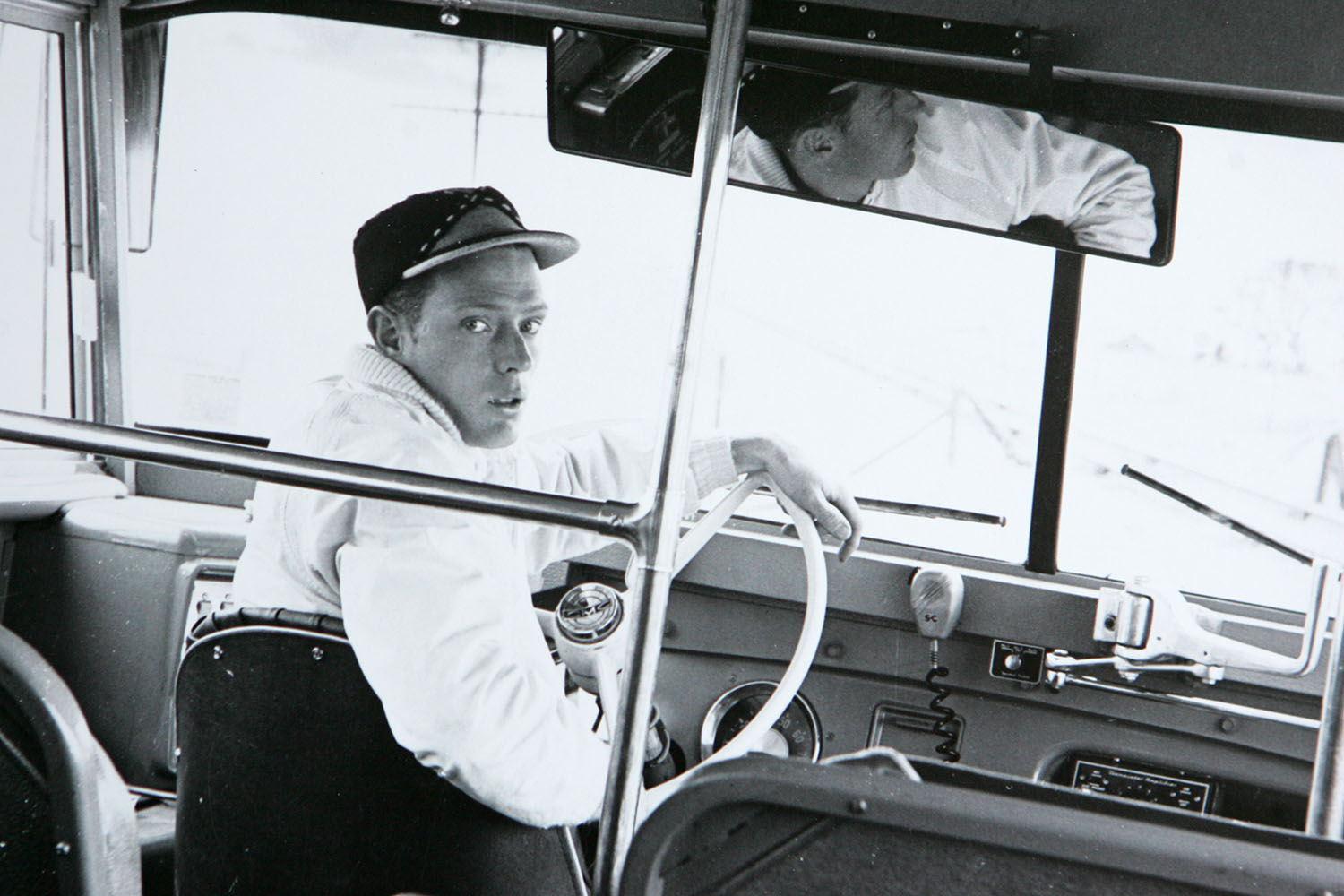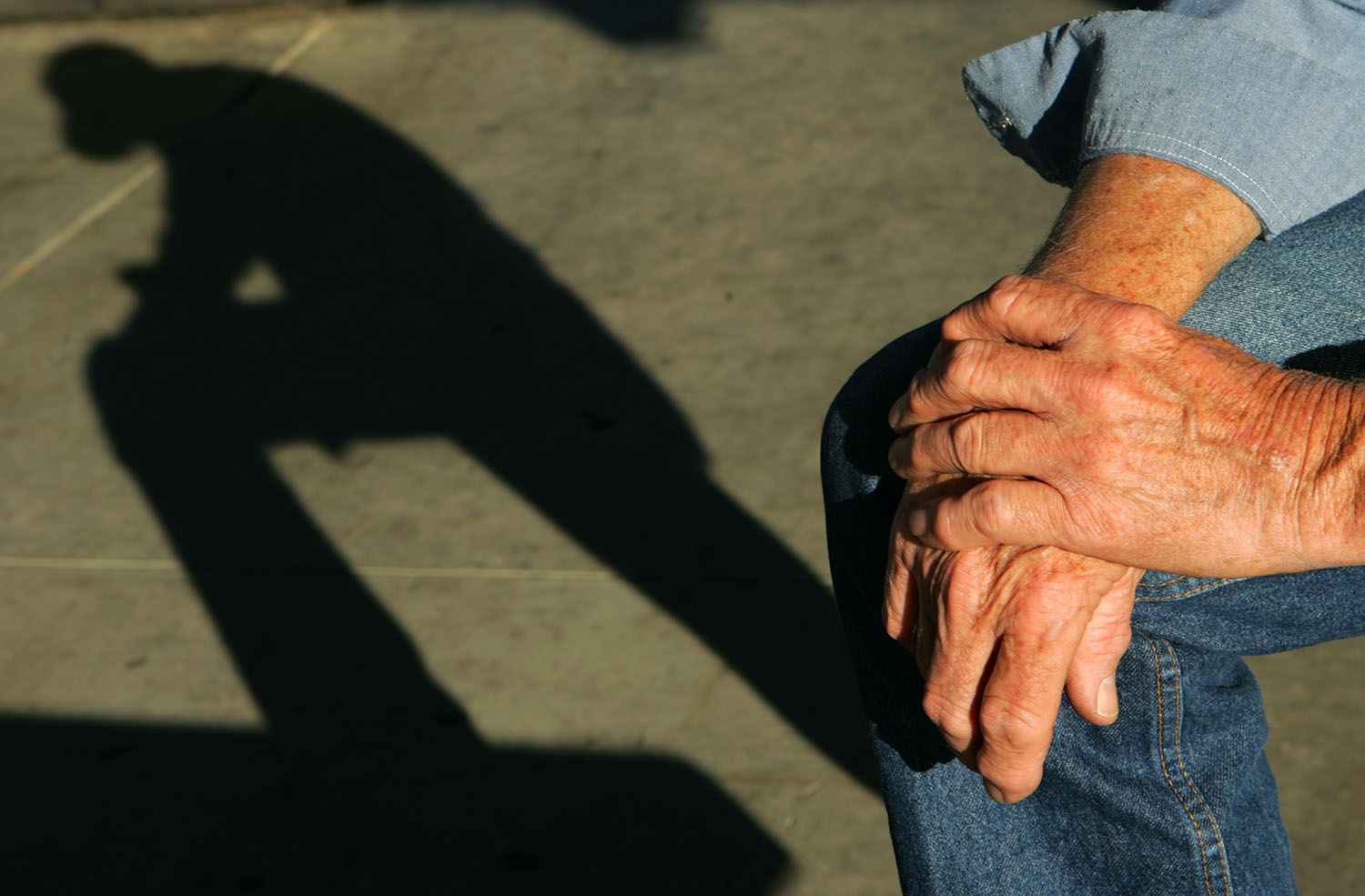
THE CROSSING
DUANE HARMS 1938-2007
HAUNTED BY CRASH
Bus driver died Sunday, losing a battle to a brain tumor. Some will remember him as a father, others as a school district electrician. But many will think of Harms and remember Dec. 14, 1961.
November 20, 2007
By Kevin Vaughan
Rocky Mountain News

COURTESY VIRGINIA SHELTON
Duane Harms was 23 years old in 1961 when he began driving a school bus in the Auburn farming area southeast of Greeley. This photograph was taken for use at his trial after the bus-train crash, the worst traffic accident in Colorado history. Twenty children died.
In the spring of 1962, Duane Harms left Colorado with his wife and baby daughter, determined to get away from the heartache of Dec. 14, 1961 — the day his school bus collided with a high-speed passenger train.
Over the years he found satisfaction as a school district electrician and contentment collecting gems and minerals, but he couldn't escape tragedy in his personal life.
And he never shook the burden of having been at the wheel of a school bus in the worst traffic accident in Colorado history — a collision that killed 20 children and injured 16 others, several seriously.
In the past year he spoke extensively for the first time about the tragedy and his other hardships, and he made it clear he accepted his life and relied on his religious faith for strength.
"We just need to trust God and hope for the best — try to live as good a life as we can," he said.
Sunday evening, after battling a malignant brain tumor for three months, Duane Russel Harms died in Southern California. He was 69.
He is survived by his wife, Judy Harms; their daughter, Lynda Jo; two sisters, Leota Constance, of Haxtun, and Elaine Jones, of Golden; and numerous other family members.
A funeral service is scheduled for 10:30 a.m. Saturday at the Berean Bible Church, 137 W. Bryan St. in Haxtun. He will be buried next to his parents in the Haxtun Cemetery.
'Deepest sympathies'
The son of Wilber and Lavena Harms, he grew up on a wheat farm outside Fleming with his sisters. And even as a boy he was fascinated with interesting rocks, arrowheads and petrified wood.
He played basketball for Fleming High, helping the team to the finals of the regional tournament in 1956.
He married Judy Dorn on Aug. 22, 1959, in Sterling.
Harms spent a year at Colorado State University but struggled with the class work and said recently he was more interested in finding a trade.

COURTESY VIRGINIA SHELTON
Duane Harms was 23 years old in 1961 when he began driving a school bus in the Auburn farming area southeast of Greeley. This photograph was taken for use at his trial after the bus-train crash, the worst traffic accident in Colorado history. Twenty children died.

CHRIS SCHNEIDER / ROCKY MOUNTAIN NEWS/2006
The sun casts a shadow of Duane Harms near his California home. He said, "It would have been better if (the crash) had taken me and left one of the kids."
So he left school and took a job with the Greeley-Evans school district while Judy finished work on her degree at what is now the University of Northern Colorado.
He worked as a janitor at two elementary schools before agreeing, in the late summer of 1961, to take on the duties of driving a school bus in the Auburn farming community, southwest of Greeley. That fall, his daughter was born.
On Dec. 14, 1961, the windows of his bus were covered with frost when he approached a railroad crossing where the road and the tracks met at an extreme angle.
Harms never saw the train, which was nearly two hours late and running at 79 mph when it smashed into the bus.
Harms was banged up but not seriously injured in the crash, and his few public comments about it in the days afterward focused on the families who lost children.
"My deepest sympathies go to them," he told a Rocky Mountain News reporter the day after the accident.
Tremendous burden
A little more than three months later, after a jury acquitted Harms of a manslaughter charge, he moved his family to California, where Judy got a job as a teacher and he went to work as an electrician for a school district.
Over the years, he saw serious mental illness overtake first his wife and then his daughter. His wife ultimately ended up in a mental institution, and he cared for Lynda until he became ill late this summer.
In the spring of 2006, the Rocky approached Harms with the idea of writing a story about the tragedy — and about the perspective that had come with the passage of more than four decades. He was reluctant, worrying that talking about the accident might hurt the families who lost children.
However, he agreed to consider the request. And in the ensuing months he spoke at length with the newspaper about the accident and about his life since then. It was clear that he carried a tremendous burden. He said that whenever he looked back on the accident he felt he had not been careful enough, and he never stopped blaming himself.
"It would have been better if it had taken me and left one of the kids in my place," he said at one point.
"The Crossing," the Rocky's examination of the lifelong impacts of the tragedy, was published in 33 installments this year.
Although some bitter feelings persisted, the vast majority of those touched by the tragedy of Dec. 14, 1961, made it clear that they cared for Harms, and many of them expressed the hope that they would be able to reconnect with him.
A few months before he became ill, Harms expressed a desire to reach out to people he had not seen since he left Colorado.
But then he got sick.
During his last interview, Harms sat in a park not far from his home as the sun slowly dipped toward the western horizon. He was asked if he thought life had been unfair to him. He said it hadn't.
"Everybody has their problems," he said simply.
Next: Vaughan a finalist for 'The Crossing' series — April 8, 2008

CHRIS SCHNEIDER / ROCKY MOUNTAIN NEWS/2006
The sun casts a shadow of Duane Harms near his California home. He said, "It would have been better if (the crash) had taken me and left one of the kids."
Back to Index